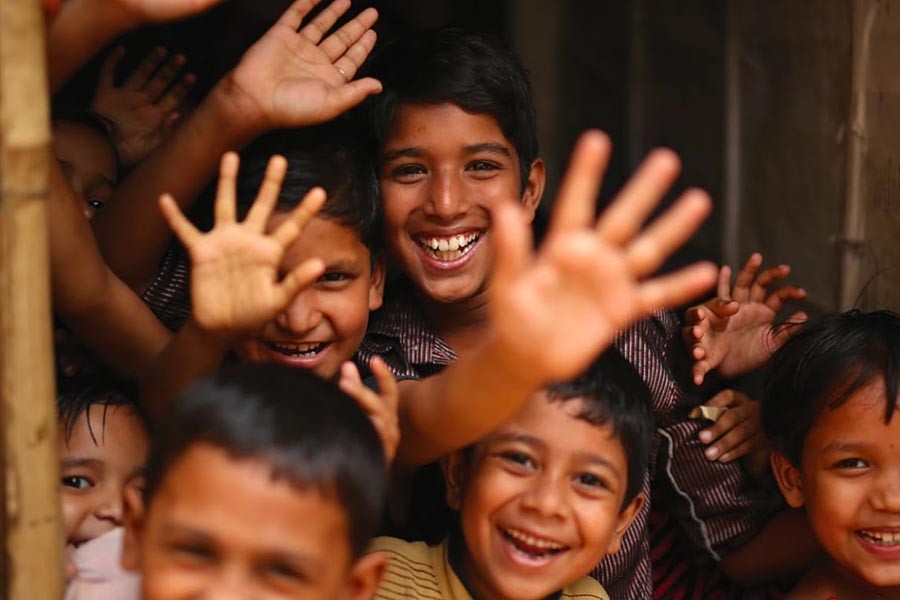Except during merrymaking on the national holidays, the faces of happy urban children have lately been absent in the country's media. The media includes both print and electronic worlds. Images of blithe and buoyant children in villages and cities used to be a normal media feature. Not long ago, the beaming faces of under-15 girl players at the venue of SAFF Football tournament filled the nation with joy. Such a view is becoming rarer nowadays. The common spectacles of children, many of them underage, show these kids toiling away in back-breaking jobs. In the large urban areas like Dhaka, they are found in dingy sweatshops working long hours. The village children are seen fishing in semi-dry water bodies using improvised devices, or carrying heavy loads of bricks at kilns. Many are spotted giving a helping hand to their parents in croplands. Little girls are found doing arduous household chores, apparently to alleviate their mothers' burden. One doesn't need to be told that they are school dropouts.
The faces of mirthful and content children continue to be scarcer by the day. Though it may appear enigmatic to many, this has lately become a reality. The ambience of the cities, especially Dhaka, remains filled with news items which are more troubling than that in circulation in villages. In the rural areas, girl children falling victim to beastly male harassment are now a normal occurrence. On the other hand, the unfortunate pre-teen girls are being married off despite the anti-child marriage campaigns getting stronger. Dhaka is largely free of this scourge. But girls are far from being fully safe here either. Like in all other parts of the country, the menace of stalking continues to haunt both grown-up and teenage girls. The culprits who comprise the stalking pack are mostly born and brought up in cities. Many of them are prematurely grown-up teenagers. Like their seniors, the wayward children build their own fraternities. They are also engaged in gang warfare.
In the past, news reports on errant boys would be found peeping occasionally amid the news of great feats by the properly groomed youths. Nowadays the shares at times seem to be equal, often the upbeat news getting eclipsed by that made by boys gone astray. The spoiling of children is blamed by a large segment of social analysts on addictions --- one linked to drugs, and the other being insidiously present online. To many, the virtual world is more monstrous and deadly than the addiction to narcotics. Urban children are increasingly avoiding socialisation and the focus on them. They love to be left alone and remain undisturbed in their exclusive cocoons. Skulking is fast becoming the norm. This state of existence leads to the spinning of wild fantasies, finally making one pathologically morbid.
Discourses, roundtables and expert seminars are regularly being held on the changing trends seen among the country's children. Notwithstanding the differences on the details of the issue, there is unanimity on the moot point. Few deny the fact that the Bangladesh children in 2018 are not the same as found ten years back. Gone for good are the brief phases of innocence and inquisitiveness characterising childhood. Adulthood experiences and knowledge about the ways of the world have got the better of the pubescent minds. Like many virtues and values of the past, childhood innocence is now a myth.
In the context of Bangladesh, the metamorphosis undergone by the children in general occurred at a pace faster than could be ever imagined. The case is unique to this middle-class status aspirant South Asian nation. Unlike many other developing countries, a section of Bangladesh children has for ages been impervious to changes. They belong to the lower rung of society. Children belonging to this class remain confined to the squalid and dreary world of struggles for eking out a living. In fact, they follow in the steps of their forefathers whose childhood witnessed the similar pattern of ordeals related to survival. There have been noticeable exceptions though. A few in the successive generations belonging to this class could manage to extricate themselves from the age-old roots. With an apparently all-round development spree defining the present Bangladesh, the number of self-made teenagers and youths continues to be on the increase. Yet they lag behind the privileged, and mostly urban, children. But it's an irony that despite being socially better placed, the latter present a morose and listless face. In contrast, the perennially deprived children, prematurely engaged in the struggle for survival, do not present an animated look either. But, historically, the working class does not fail to make the best of their short breaks from the gruelling work hours.
It may not be an overstatement to view the children of Bangladesh as victims of a malaise. It should not have happened, since in global perspective the country is still a struggling one in essence. But in a globalised world, the children of the country could not be kept away from the vices of the times. The maladies continue to overtake the children and youths in scores of visibly innocuous guises. How many of the socio-cultural pioneers could ever foresee the other face lurking beneath the veneer of the technological breakthroughs of computers and their later versions? At present, a whole generation of youths, teenagers included, remains hooked on the virtual reality, with little links to the mundane world.
A big difference can be made by weaning off the hooked generation from the excesses indulged online by many of them. Activities making the real world tempting and worth basking in ought to be undertaken on the part of the state and private entities. What the children need badly is engagement, not withdrawal. They should be taught how to shout, and laugh heartily. As children need moments of silence and reflections, they also require platforms to celebrate victory in broad daylight. It could be playgrounds, or the streets resonating with the demand for safe roads.


